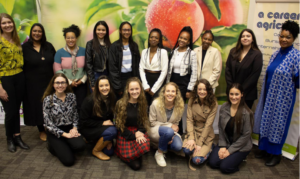Hortgro, the South African deciduous fruit industry organisation, has invested nearly R50 million in bursary schemes over the past ten years. During 2023, 35 undergrad students from eight higher education institutions received financial aid to the value of R1.86m, while 28 post-graduate students linked to the Hortgro research programme, received bursaries to the value of R2.84m.
Hortgro Executive Director, Anton Rabe, shared these “agricultural investment” figures at the annual Hortgro Bursary Function that was held at STIAS. “Transformation is a process, not an event, and requires a suite of diligent, consistent and competent technical support, training, and mentorship covering various dimensions of farming and agri-businesses,” Rabe said.
Hortgro started its transformation journey in 1998, just after deregulation, with the adoption of a “Transformation Declaration of Intent” and the subsequent appointment of a transformation manager. With several different transformation programmes implemented over the years, Hortgro has always maintained that these must be sustainable, impactful, and meaningful.
“We are not chasing numbers, but want to ensure success over time, including bridging the generational challenge to ensure that the next generation continues with the journey,” Rabe said.
The Hortgro Bursary Programme is one of Hortgro’s success stories – with the aim to attract young people to choose agriculture as a career and equip them for positions in the value chain. Rabe said that Hortgro’s bursary programme received an astounding 850 applications for 2024.

“Over the past ten years 262 undergrad students received bursaries to the value of R13m, and 483 post-graduates received R35.5m. We have a long way to go, but I believe we have established a sound foundation to build on.”
Portia Solomon, a Hortgro bursary holder doing her MSc in horticulture, shared her journey with the other students. “After qualifying and working as a civil engineer, I had serious doubts about my career choice. As a city girl, I have never had exposure to agriculture, but after being exposed to the incredible world of orchards and farming, I decided to change track. Who knew there was a whole science involved in producing a plum?”
Solomon said that not everyone understood why she left behind a lucrative career to start from scratch, but that she was certain that she “wanted to work with plants”. Solomon received an undergraduate and post-graduate bursary from Hortgro and is currently working as an intern at Provar, an independent cultivar evaluation company. “We are the next generation of innovative thinkers. We are like athletes. Hortgro is like Adidas or Nike, enabling us to reach success. We have the privilege of being supported, make the most of this opportunity.”
Darryl Jacobs, Western Cape Deputy Director-General: Agriculture Development and Support Servies, also shared his journey into agriculture with the students. He encouraged students to find their own life philosophy but to remain humble, keep a sense of humour, stay optimistic, have passion, and purpose, and always strive for excellence. “The two most important days in your life are the day you are born, and the day you discover your purpose for living. I challenge you to discover your ‘why’ and become the best version of yourself.”
Learning and development initiatives by Hortgro include:
- Mentorship programme for about 30 interns per year with at least 80% of them finding permanent jobs in the industry annually.
- A leadership programme aimed at developing future industry leaders.
- Production manager development programme.
- Sponsorship for an 18-month NQF4 level plant production learnership programme.
- Partnering with other industries to develop QCTO qualifications.
- Worker leadership training programme for trade unions.
- Various health and safety training courses.
Relevant Agribook pages include “Deciduous fruit” and “Careers and employment in Agriculture“.
Photo by Shahab Vejdanian on Unsplash
